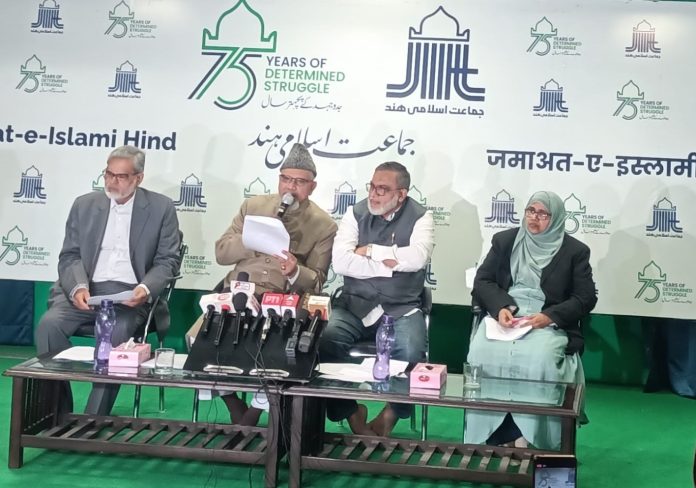Prof. Salim Engineer, Vice President of Jamaat-e-Islami Hind asked the Government to accept genuine concerns of farmers and their demand for MSP. He was addressing media persons at JIH headquarters on Saturday. Other Jamaat leaders spoke on Marriage Act, UCC, closure of Maulana Azad Educational Foundation (MAEF), violation of Places of Worship Act and alarming custodial rape figures.
On farmers’ demand, Prof. Salim said, “We agree with their proposal that MSP for agricultural produce is legally guaranteed. Not just some crops, but all crops must be covered under MSP. Farmers are being harmed by the existing market-driven pricing process, which is unpredictable. The government must simultaneously address the resource shortage, climate change-related concerns, falling water tables, and socio-economic shifts that have an impact on farmers’ financial stability.”
On MAEF Closure, Prof Salim said, “JIH strongly condemns the decision of Ministry of Minority Affairs (MoMA) to close down MAEF. The move is a severe blow to the educational growth of Muslims in India. Sachar Committee and Mehmood-Ur-Rehman Committee Reports strongly recommended the route of affirmative action (reservation) for the upliftment of the community. If the government continues to close down schemes such as MAEF, it would be against their educational rights.”
The JIH Vice President, Malik Moatasim Khan said, “The Assamese government’s proposal to revoke the 1935 Assam Muslim Marriages and Divorces Registration Act is a ploy to harass Muslims. Currently, government-approved Qazis handle the registration procedure for Muslim marriages and divorces in the state under the 1935 Act. Muslims in Assam will now need to register marriages per the 1954 Special Marriage Act. We believe that this judgment not only violates the letter but also the spirit of the Constitution, demonstrating the state government’s anti-Islamic nature.”
On UCC, he stated, “No government has the authority to impose decisions on any religious community without first consulting them, especially if those decisions concern laws that they have religiously. We believe the events in Assam and Uttarakhand are part of a larger trend in India where politicians from the ruling party, even chief ministers, are viewing hate speech and actions that harm the Muslim minority as a means of advancing their political careers. This trend must be opposed by all justice-loving citizens.”
“JIH, while expressing serious concern over the safety and protection of Muslim places of worship, said there have been instances where District administration, State government, and sometimes even the judiciary played a one-sided role and allowed unauthorized activities within the premises of the mosques,” Assistant Secretary Inamur Rehman said in response to a question. Dubbing them illegal constructions or causing traffic issues, historic mosques are being targeted for demolition. JIH places a strong emphasis on following the Places of Worship Act 1991.”
JIH National Secretary Rahmathunnissa said, “According to NCRB data from 2017 to 2022, there have been over 270 reported cases of rape in custody. These incidents involve perpetrators from various backgrounds, including police personnel, public servants, members of the armed forces, as well as staff from jails, remand homes, places of custody, and hospitals. It is quite disgraceful that so many individuals in positions of authority have been caught taking undue advantage of their power to commit rape against women. The alarming prevalence of custodial rape points out the urgent need for a victim-centric approach, strengthened legal frameworks, and institutional reforms to address the root causes and consequences effectively.”
She added, “JIH believes a holistic approach is necessary to tackle the root causes and consequences of custodial rape. Unless the values of fear of God and accountability in the Hereafter are inculcated in people, sexual exploitation of women will continue to fester humanity. We should not ignore the moral training and character-building of society. This has to begin at an early age. Moral education in schools and training institutes must be part of the curriculum. While it’s important to have stringent laws, speedy trials, and exemplary punishment for rapists, the question of moral reform of society is equally important.”




